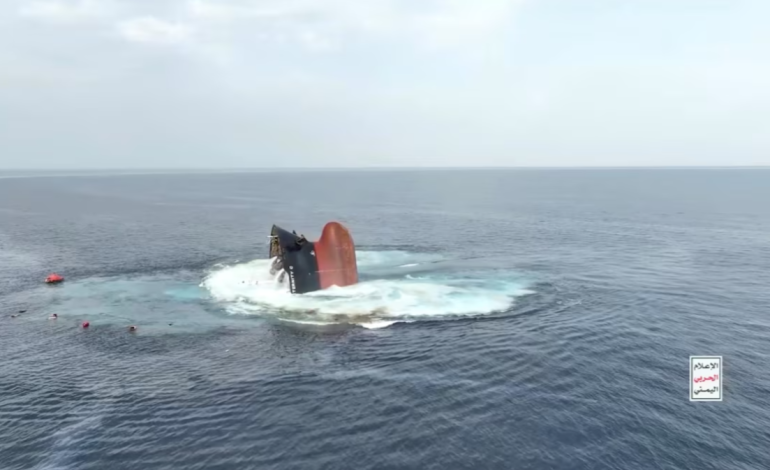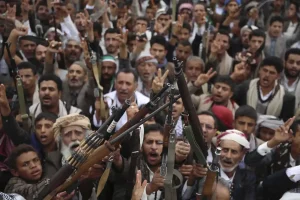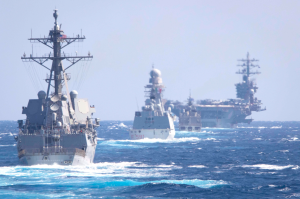EXCLUSIVE: Red Sea on Edge. Houthis Escalate Maritime Blockade Against Israel.

The Red Sea has once again become a flashpoint in the Middle East conflict, as Yemen’s Houthi rebels intensify their attacks on international shipping in what they claim is a blockade of Israeli-linked vessels. The renewed violence in July marks a dangerous development in the decade-long Yemeni civil war and signals widening regional instability linked to the ongoing Israeli activity in Gaza.
On July 7 and 8, two commercial vessels—the Magic Seas and Eternity C—were struck by missiles in the southern Red Sea. The Eternity C, a Liberian-flagged bulker, sank with several crew members missing or suspected kidnapped, drawing swift international condemnation. The Houthi movement, officially known as Ansar Allah, claimed responsibility, calling the attacks part of their effort to “cut off Israeli access to the sea.”
These strikes are the latest in a campaign that began in late 2023, when the Houthis declared a maritime blockade of Israeli ports in response to Israel’s military operations in Gaza. Since then, over 140 attacks have been reported, targeting vessels linked—sometimes tenuously—to Israel or its allies. Israeli airstrikes on Houthi-held Yemeni ports followed this week’s incidents, escalating a confrontation that now entangles the Red Sea’s vital commercial corridors.

The Houthi campaign raises urgent legal and geopolitical questions. International maritime law prohibits the targeting of civilian vessels, especially in international waters. Analysts suggest the Houthis’ declaration of a blockade does not meet the legal standards of a recognized belligerent under international humanitarian law.
The economic impact is already severe. The Red Sea accounts for approximately 12% of global trade via the Suez Canal. With over 1,000 vessels rerouting around the Cape of Good Hope to avoid Houthi-controlled waters, shipping times have increased by up to two weeks. The Houthi threat has raised insurance costs for ships worldwide. The highest rates are for ships transiting the Suez Canal, with rates now reaching as high as 2% of a value for vessels that transit the Red Sea.
For deeper strategic understanding, Wyoming Star contacted Dr. Jeremy Stöhs, an Austrian-American security and defense analyst and policy advisor.
Wyoming Star: Can you give a short breakdown of the current political situation in Yemen? The country has been engulfed in a civil war since 2014, and Houthis are but one of the militant groups there. What’s their political standing in the region?
Jeremy Stöhs: Yemen remains fractured. The Iran-aligned Houthis control the north and capital Sanaa, while the Southern Transitional Council (STC) and Saudi-backed government hold parts of the south.
The Houthis now function as de facto state actors, with control over military, tax, and judicial systems across their territory.
Regionally, their standing has grown due to successful military operations and support from Iran as part of the self-proclaimed ‘Axis of Resistance.’
Wyoming Star: How effective has the Houthi maritime blockade in the Red Sea and now Haifa been in putting economic and political pressure on Israel? Do you assess the Houthi strategy as militarily sustainable or primarily symbolic?

Jeremy Stöhs: Houthi actions cannot be considered a blockade in the traditional sense of the word. Yet their attacks on shipping have had a real economic impact: shipping costs have surged, many vessels have been rerouted around Africa, and Israeli port activity has dropped. However, militarily, it is more symbolic—a means of asserting influence, demonstrating alignment with Palestinian causes, and undermining Israeli maritime activities. Their campaign has pressured Israel, but the Houthis’s limited naval capacity makes long-term success or the establishment of a full blockade difficult, if not impossible.
Wyoming Star: What are Israel’s immediate security concerns after the blockade expanded to Haifa?
Jeremy Stöhs: Israel is now concerned about long-range missile and drone strikes that threaten shipping lanes and critical infrastructure in the north. The expansion of the Houthi threat to Haifa also signals possible coordination between fronts, raising fears of multi-theater conflict including Hezbollah in the north and Hamas remnants in Gaza.
Wyoming Star: Could Israeli military strikes in Yemen risk drawing it into a prolonged conflict similar to its engagement in Gaza or Lebanon? Are those strikes proportional considering the reported civilian casualties?
Jeremy Stöhs: It is possible. Houthis have been attacking ships for several years, and Israel is showing no sign of slowing its military operations against radical Islamist groups across the region. Israel’s June 2025 missile strike on Hodeida can be considered a strategic escalation. While effective, these attacks risk entrenching Israel in another long conflict without clear exit strategies. Not least because the Houthis have shown considerable resilience over the past years.
Without regional or international coordination, this could mirror the attritional dynamics of Gaza or Lebanon.
Wyoming Star: How do Houthi attacks complicate US and European naval and diplomatic operations?
Jeremy Stöhs: They expose diverging strategic approaches and weaknesses in Western naval capabilities and coordination. As reports have noted, NATO and the EU maritime assets operated in parallel but with little coordination, limiting their effectiveness. The short-term US–Houthi ceasefire, which excludes Israel, complicated common policies among Western allies and partners. Diplomatically, the attacks strain Gulf-West relations and make US mediation in the region more difficult, especially as Houthi aggression is linked to Iranian influence.
Wyoming Star: Why was the US bombing campaign unsuccessful? What long-term policy adjustments should NATO or EU member states consider?
Jeremy Stöhs: The campaign achieved tactical wins—e.g., destroying launch sites—but failed strategically, as the Houthis adapted quickly. With the political groundwork and forces on the ground missing, Houthis quickly ended the cease-fire and recommenced attacking civilian shipping.

For long-term success, NATO and the EU must draw upon more readily available maritime capabilities, better coordinate operations (NATO–EU deconfliction), invest in shared logistics, build a maritime security framework with regional states, and integrate naval action with political and economic tools.
Wyoming Star: How might ongoing instability in Yemen and growing Houthi military capability reshape regional power dynamics? Which countries are the primary beneficiaries of the current situation in the Red Sea, and which are the most negatively affected?
Jeremy Stöhs:
Iran and its proxies benefit, gaining leverage without confrontation. The Houthis, now considered a viable regional actor, expand Iran’s reach in the Red Sea.
Negatively impacted are: Israel, through increased threat and trade disruption; Egypt, which relies on Suez Canal traffic; and European states, which face economic costs and naval overstretch. At the same time, both the Mullahs in Iran and the Islamist Houthis have come under tremendous pressure as of late, which ultimately could lead to the demise of both regimes.
Wyoming Star: Is the current Red Sea Crisis a symptom of the broader Iran-backed “Axis of Resistance” strategy against Western and Israeli interests? Do you see any potential risks of a broader regional conflict?
Jeremy Stöhs: The Houthis are integral to Iran’s regional proxy strategy, projecting force at low cost. It is important to note that the Houthis are in many ways semi-autonomous, and Tehran has only so much influence over them. Escalation is likely if Israeli strikes intensify or if Iran perceives a threat to its position. US involvement has grown quickly—from being focused primarily on protecting ships and avoiding entanglement to a significant air campaign against Houthi targets and Iran’s nuclear program. Despite current indications that the US does not seek an extended military campaign in the region, escalation is possible, particularly if Iran were to effectively hit US assets in the region.
Wyoming Star: What would a diplomatic off-ramp look like for de-escalating tensions between Israel and the Houthis, if one is possible at this point? What can be learned from the US–Houthi deal?

Jeremy Stöhs: A limited ceasefire is theoretically possible, as shown by the US–Houthi deal brokered in May 2025. However, that agreement has since collapsed—with another ship reportedly sunk in early July—demonstrating how fragile de-escalation efforts are without broader regional buy-in or enforcement mechanisms.
A durable off-ramp would likely require third-party mediation (likely Oman or Qatar), recognition of Houthi leverage, and a linkage to de-escalation in Gaza and Lebanon. Without that, short-term truces are unlikely to hold.
Dr. Jeremy Stöhs co-heads the Austrian Center for Intelligence, Propaganda & Security Studies at the University of Graz (ACIPSS) and is a senior fellow at the Institute for Security Policy at Kiel University (ISPK). His publications include The Decline of European Naval Forces: Challenges to Sea Power in an Age of Fiscal Austerity and Political Uncertainty (Naval Institute Press, 2018) and European Naval Power: From Cold War to Hybrid Wars (Palgrave Macmillan pringer, Cham, 2024). Jeremy holds a Ph.D. in political sciences and regularly teaches at several universities and defense colleges.









The latest news in your social feeds
Subscribe to our social media platforms to stay tuned